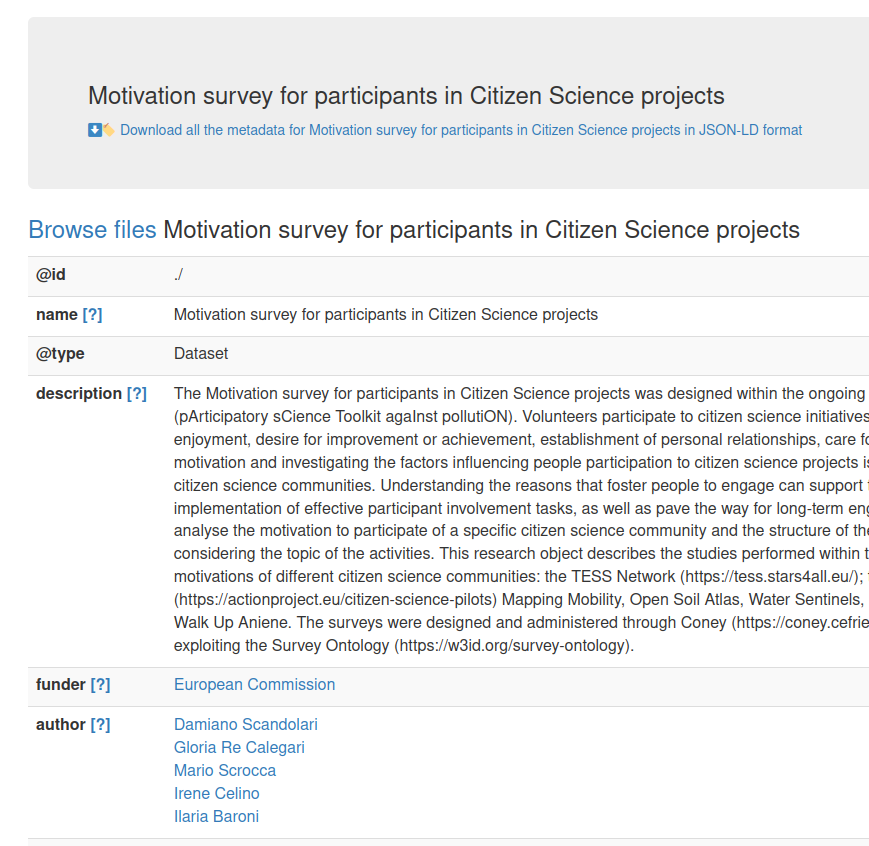Survey Ontology
The Survey Ontology is an open vocabulary that allows representing, annotating and sharing a representation of the survey structure and the gathered responses (Scrocca et al., 2021).
The Survey Ontology leverages and extends the Research Object Suite of Ontologies (Belhajjame et al., 2015) to address the research object principles of identity, aggregation and provenance.
The Survey Ontology models:
- a complete survey research study as a research object,
- the survey procedure as a scientific workflow (wfdesc module), and
- the survey’s collected answers as provenance traces of its execution (wfprov module).
A survey research object aggregates two main resources identified in the ontology: (i) a survey procedure, describing the survey structure (questions, answers, etc.), and (ii) a survey dataset, containing the collected answers.
Moreover, a survey research object can aggregate any other additional resource, e.g., representing study hypotheses, investigated variables, models produced from the result analysis, related publications, etc.
Considering a survey procedure, all the questions can be annotated with the respective latent variable investigated. Moreover, closed answers can be associated with both a qualitative value, a textual label to be displayed in the chat, and a quantitative value, the numerical coding for results analysis.
Coney, the conversational survey tool, allows to automatically export data of surveys designed and administered through it using the Survey Ontology.
Use case: Survey Study about Motivation for Participants in Citizen Science Projects
This section describes the research objects defined and published to share a survey study of motivation for citizen scientists performed within the ACTION project. The research objects leverage the RO-Crate specification and the Survey Ontology to describe the relevant resources and their relations.
Survey data exported from Coney and modelled using the Survey Ontology, are packaged in comprehensive RO-Crate research objects including:
- the representation of the survey procedure,
- the collected answers with provenance information,
- the script and results of the analysis, and
- related publications.
Resources made available within each research object are:
- Survey Procedure (
*-procedure.ttl): contains the RDF representation of the structure of the conversational survey (questions, answers, etc.) using the Survey Ontology - Survey Results (
*-results.ttl): contains the RDF representation of the answers collected using the Survey Ontology - Survey (
*-survey.ttl): contains a comprehensive RDF representation of the survey data using the Survey Ontology - _CSV Survey Results _(
*-results.csv): contains the CSV of the collected answers - Analysis Script (
*-script.R): is the R script developed to analyse the collected answers - Mean-Var-Questions (
*-mean-var-motivating-questions.csv): contains the computed mean and average for each question considered (observable variables) - Mean-Var-Factor (
*-mean-var-motivating-factor.csv): contains the computed mean and average for each motivation factor considered (latent variables) - Correlation-Global-Motivation (
*-correlation-factors-global-motivation.csv): contains the correlation analysis between each motivation factor and the global motivation
Each RO-Crate also defines two CreateAction entities to describe provenance information:
- Export Survey Data: specifies which files, representing survey data, were extracted using Coney;
- Run survey results analysis: specifies (i) which file, representing the CSV results of the survey, was used to run the analysis, (ii) which file, representing the R script, was used to run the analysis, and (iii) specifies which files, representing the results of the analysis, were generated.
The defined research objects are publicly available on Zenodo within the ACTION community. The RO-Crates for each administered survey have the following identifiers:
- Walk Up Aniene Motivation Survey https://doi.org/10.5281/zenodo.5753229
- TESS Network Motivation Survey https://doi.org/10.5281/zenodo.575376
- Restart Data Workbench Motivation Survey https://doi.org/10.5281/zenodo.5753123
- Open Soil Atlas Motivation Survey https://doi.org/10.5281/zenodo.5752354
- Mapping Mobility Motivation Survey https://doi.org/10.5281/zenodo.5727476
- Wow Nature Motivation Survey https://doi.org/10.5281/zenodo.5770198
- Water Sentinels Motivation Survey https://doi.org/10.5281/zenodo.5770164
The research object for the overall study “Survey Study about Motivation for Participants in Citizen Science Projects” is identified with https://doi.org/10.5281/zenodo.5753092 and references all the others.
The survey research data made available in the RO-Crates using the Survey Ontology, have been also published as Linked Open Data.
Each RO-Crate on Zenodo lists as a related identifier the IRI assigned to the survey research object entity described in RDF. For example, https://coney.cefriel.com/lod/Survey_626734392-1569918565818 identifies the one for the TESS Network Motivation Study.
Exploiting a customisation of the LodView framework, the data can be easily navigated through a user interface and downloaded in different formats. The interface is also enriched with the ontology documentation and offers information on the entities and properties used for the data. A SPARQL endpoint is available at https://coney.cefriel.com/sparql to semantically query and discover the available data.
Resources
- Survey Ontology: https://w3id.org/survey-ontology
- Example RO-Crate: https://doi.org/10.5281/zenodo.5753092
- Coney Toolkit: https://coneytoolkit.cefriel.it/
- Slides: https://repository.publisso.de/resource/frl:6430057/data
Publications
Mario Scrocca, Damiano Scandolari, Gloria Re Calegari, Ilaria Baroni, Irene Celino (2021):
The Survey Ontology: Packaging Survey Research as Research Objects.
2nd Workshop on Data and Research Objects Management for Linked Open Science https://doi.org/10.4126/FRL01-006429412
Esteban Gonzalez, Mario Scrocca, Oscar Corcho (2022):
D4.7 - Research Objects Catalogue v2. Project Deliverable, ACTION, Zenodo
https://doi.org/10.5281/zenodo.6346392
Esteban Gonzalez, Oscar Corcho. (2022):
D4.5 - Open Data Portal v2.
Project Deliverable, ACTION, Zenodo
https://doi.org/10.5281/zenodo.6346406
